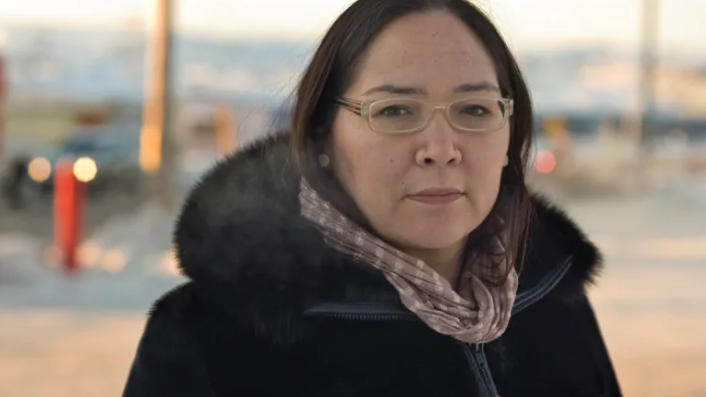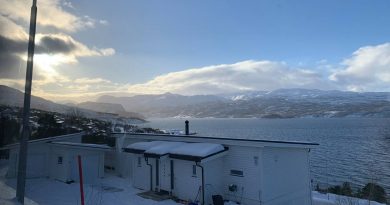U.N. Year of Indigenous Languages: When policy isn’t enough

The United Nations has designated 2019 as the Year of Indigenous Languages.
The goal is to to make people more aware of the languages and their role in cultural preservation.
Throughout the year, Eye on the Arctic will be checking in with First Nations and Inuit communities across the North to talk policy, education and strategies for language preservation and promotion in their regions.
In this instalment, we turn the spotlight on language policy in Canada’s eastern Arctic territory of Nunavut. The region marked the 20th anniversary of its creation on April 1. While there was much to celebrate, language, one of the cornerstone foundations of Nunavut’s creation, has not produced the results that were both promised and hoped for.
Although English and French are the official languages of Canada, Nunavut territory is 84 per cent Inuit, where 22,600 of the territory’s 39, 944 people speak Inuktut (a term used in Nunavut to refer to its Inuit language dialects) as their mother tongue.
But despite this, the Nunavut government still functions in English and the majority of the programs and services provided are done so in English.
To find out more, Eye on the Arctic spoke with Aluki Kotierk, the president of Nunavut Tunngavik Inc., the Nunavut land claims organization.
Eye on the Arctic: Language was one of the cornerstones of the Nunavut Project, what went wrong?
Aluki Kotierk: In the wake of the creation of Nunavut there were discussions between the federal finance department and the finance department of the government of the Northwest Territories in terms of what resources would be allocated to ensure that the territorial public government could function. And I think there was a decision made at that time, to discuss at a later time, what resources would be required to make Inuktut the working language of the territorial public government. Sufficient resources were never provided in the creation of the territory of Nunavut.
Is it simply a policy issue, or did the lack of a standarized Inuktut dialect and writing system also contribute to challenges of developing a global language and education policy?
We currently have a number of writing systems. Certainly by having one standarized writing system, it would increase the ability for Inuit all across Inuit Nunangat (Canada’s four Inuit land claims regions) to share resources that they produce. But for Nunavut, even though there’s different dialects, I don’t think that’s a real issue in terms of the vitality of our language in the territory.
Were there missed opportunities over the last 20 years in addressing the erosion of the language?
We know currently that Inuktut is declining by 1 per cent per year in Nunavut and we know if that trend continues, by 2051 only 4 per cent of us will be speaking Inuktut in the home. Having said that, one of the great accomplishments of the Government of Nunavut in the last 20 years is the passing of the Inuit Language Protection Act in 2008. I think that gave many Inuit lots of hope that the government would be providing protections for Inuit language rights and that Inuktut would continue to be a language that is thriving.
In 2006 the Government of Nunavut put out a strategy to recruit Inuktut speaking teachers. Unfortunately, that strategy was not resourced. So currently there’s a dearth of Inuktut-speaking teachers. So the government finds itself in the position of being unable to provide Inuktut as the language of instruction.
What needs to change?
All governments of Nunavut have committed to the aspiration of having Inuktut being the working language of the territorial public service, but if there are no resources provided, I don’t think that will become a reality in the short term because there are so many competing needs in our territory.
My view is that the federal government of Canada has a history of doing its share to diminish how many people speak Inuktut through the residential school system. They invested in buildings and personnel so Inuit children could be sent away to learn English and ways that were not based on Inuit culture.
I think the current government has the responsibility to reverse that trend and provide the necessary resources so that the 42 English schools in Nunavut are resourced sufficiently so they can provide Inuktut-language instruction from Kindergarten to Grade 12. We expect that Inuit children in Nunavut should be able to graduate bilingual in Inuktut and English, having a great foundation in their Inuit identity but knowing that they are part of Canada and proud Canadians that can contribute in a positive way anywhere across Canada.
I would implore the federal government, as they look at their current legislation on Indigenous languages, that they ensure that there are specific provisions in there to address the needs of Inuit in Canada.
Write to Eilís Quinn at eilis.quinn(at)cbc.ca
Related stories from around the North:
Canada: Not a ‘bad thing’ if Canada’s Nunavut territory sued over bilingual education, says lawyer, CBC News
Finland: Budget cuts threaten international Sámi language cooperation, Yle News
Iceland: Can environmental diplomacy save Arctic languages?, Blog by Takeshi Kaji
Russia: Sami languages disappear, The Independent Barents Observer
United States: Alaskan Inuit dialect added to Facebook’s Translate app, CBC News



